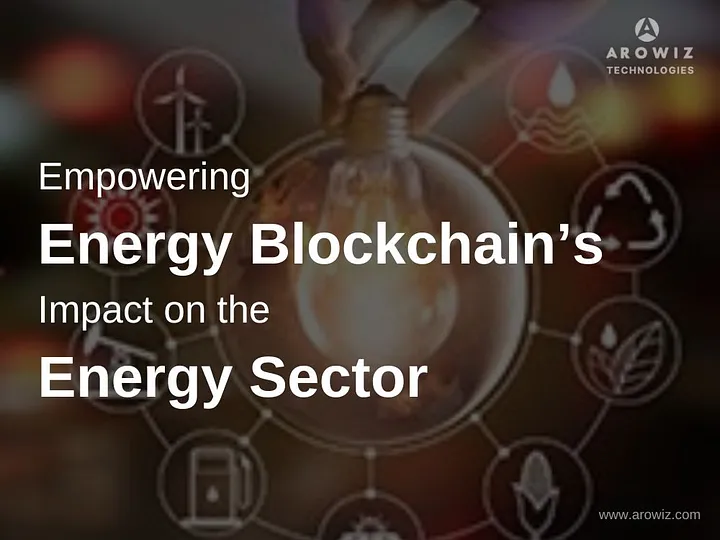Blockchain technology has emerged as a transformative force across various industries, including the energy sector. Its decentralized and transparent nature…
Empowering Energy : Blockchain’s Impact on the Energy Sector
admin
- February 29, 2024
4 min read

Blockchain technology has emerged as a transformative force across various industries, including the energy sector.
Its decentralized and transparent nature offers promising solutions to longstanding challenges in energy management and distribution.
What is Blockchain in the Energy Sector?
Blockchain in the energy sector refers to the use of distributed ledger technology to record and validate transactions related to energy production, distribution, and consumption. It enables secure and transparent peer-to-peer transactions without the need for intermediaries.
Why is Blockchain Needed in Energy?
The energy sector faces numerous challenges, such as inefficient processes, lack of transparency, and centralized control. Blockchain addresses these issues by providing a decentralized and tamper-proof platform for managing energy transactions.
Why Blockchain is Useful in Energy Sector?
Blockchain enhances trust and transparency by enabling real-time tracking of energy transactions, reducing the risk of fraud and manipulation. It also promotes greater efficiency by streamlining processes and enabling automated smart contracts.
Types of Blockchain Applications in Energy —
- Peer-to-Peer Energy Trading:
Allows individuals and organizations to buy and sell excess energy directly to one another. - Grid Management:
Facilitates better coordination and optimization of energy distribution within the grid. - Renewable Energy Certificates:
Verifies and tracks the generation and consumption of renewable energy. - Supply Chain Management:
Improves transparency and traceability of energy sources from production to consumption. - Electric Vehicle Charging:
Enables seamless and secure payment for electric vehicle charging services. - Microgrids:
Supports the creation of localized energy systems that can operate independently or in conjunction with the main grid.
Features of Blockchain Technology in Energy Sector —
- Decentralization:
Eliminates the need for centralized authorities, reducing the risk of manipulation and downtime. - Immutability:
Once recorded, transactions on the blockchain cannot be altered or deleted, ensuring data integrity. - Transparency:
All participants have access to a transparent and auditable record of transactions. - Security:
Utilizes cryptographic techniques to secure transactions and protect sensitive data. - Smart Contracts:
Automates contract execution based on predefined conditions, reducing the need for intermediaries. - Scalability:
Offers the potential for scalable solutions to accommodate the growing demands of the energy sector.
Partner with blockchain experts and invest in research to integrate.Blockchain technology into your energy operations. Talk To Blockchain Expert
Benefits of Implementing Blockchain in Energy —
- Cost Savings:
Reduces transaction costs and operational overheads associated with traditional energy systems. - Increased Efficiency:
Streamlines processes and eliminates intermediaries, leading to faster and more efficient transactions. - Enhanced Security:
Provides a secure and tamper-proof platform for storing and sharing energy data. - Greater Transparency:
Improves transparency and accountability by providing a verifiable record of energy transactions. - Empowered Consumers:
Enables consumers to have more control over their energy usage and expenditure. - Environmental Impact:
Facilitates the transition to renewable energy sources and supports sustainability initiatives.
Utilization Cases of Blockchain in Energy Sector —
- Solar Energy Trading:
Allows homeowners with solar panels to sell excess energy to their neighbors. - Electric Vehicle Charging:
Enables seamless payment for electric vehicle charging services using blockchain-based tokens. - Grid Optimization:
Improves the efficiency of energy distribution by optimizing grid management through blockchain technology. - Renewable Energy Certificates:
Tracks the generation and consumption of renewable energy certificates to support renewable energy initiatives. - Energy Financing:
Facilitates access to financing for energy projects through blockchain-based crowdfunding platforms. - Energy Traceability:
Provides consumers with transparent information about the source and journey of their energy supply.
Blockchain Technologies for Energy Applications —
- Ethereum:
A versatile blockchain platform that supports smart contracts and decentralized applications for energy trading and management. - Hyperledger Fabric:
A permissioned blockchain framework ideal for enterprise applications, offering privacy and scalability for energy-related use cases. - Ripple:
Facilitates real-time, cross-border payments and settlements, benefiting energy companies with international operations. - IOTA:
A distributed ledger specifically designed for the Internet of Things (IoT), enabling secure and scalable machine-to-machine transactions in the energy sector. - VeChain:
Utilizes blockchain technology to improve supply chain management and enhance transparency in the renewable energy sector. - Hashgraph:
Offers a high-throughput, low-latency alternative to traditional blockchain technology, suitable for energy applications requiring real-time transaction processing.
The Future of Blockchain in Energy Sector —
The future of blockchain in the energy sector looks promising, with continued innovation and adoption expected to drive efficiency, transparency, and sustainability across the industry. As technology matures and regulatory frameworks evolve, blockchain is poised to play a pivotal role in shaping the future of energy.
How can Arowiz Technologies help with Blockchain Integration in Energy?
Arowiz Technologies specializes in blockchain solutions for the energy sector, offering tailored applications to meet specific business needs, from peer-to-peer energy trading to grid optimization. With over 12 years of commercial experience and a track record of delivering successful projects, I provide expertise in blockchain and mobile app development, helping clients achieve significant funding and startup success.
Let’s leverage these cutting-edge technologies to drive innovation and growth in your industry.
Get ahead in energy with Arowiz Technologies’ blockchain solutions.Embrace efficiency, transparency, and sustainability for lasting success. Talk To Blockchain Expert
FAQ —
Q1. What is blockchain technology?
Ans. Blockchain is a decentralized digital ledger that records transactions across multiple computers in a secure and transparent manner.
Q2. How does blockchain benefit the energy sector?
Ans. Blockchain enhances trust, transparency, and efficiency in energy transactions, enabling peer-to-peer energy trading, grid optimization, and renewable energy tracking.
Q3. Is blockchain secure?
Ans Yes, blockchain uses cryptographic techniques to secure transactions and protect sensitive data, making it highly secure against tampering and fraud.
Q4. Can blockchain support renewable energy initiatives?
Ans. Yes, blockchain can track the generation and consumption of renewable energy certificates, support peer-to-peer energy trading of solar power, and facilitate financing for renewable energy projects.
Q4. Is blockchain technology scalable for the energy sector?
Ans. Yes, blockchain technology offers the potential for scalable solutions to accommodate the growing demands of the energy sector, with ongoing research and development focused on improving scalability.
Conclusion
Blockchain tech can transform energy by streamlining transactions, enabling secure payments, and automating agreements. It enhances grid management, facilitating peer-to-peer energy sharing and optimizing resource allocation.
With these benefits, blockchain can reshape the energy sector for resilience, responsiveness, and sustainability.
Pro Tip — Key Strategies for Leveraging Blockchain in Energy
Blockchain is a secure digital ledger changing industries. In energy, it boosts grid management, renewable energy use, and transaction efficiency. It enables direct energy trading and efficient supply chains, making energy cleaner and cheaper. Let’s harness blockchain for a greener future.
Join our free newsletter for more insights — click the link below
Subscribe to our Newsletter: https://lnkd.in/dYmBdX3c
Follow us on LinkedIn: https://lnkd.in/d4KZJakS.
Tags
Our New Letter
Get productivity tips delivered straight to your inbox
Ready for more?

Arowiz Technologies is a Central India-based customer Centric software development & Expert IT Staff Augmentation company ...
FOR JOBS
hr@arowiz.comFOR SALES
sales@arowiz.comMARKETING / BLOGS
info@arowiz.comGET CONNECTED
Top Industry
About Us
Top Services
Hire Expert Developers
- AI / ML Developers
- Blockchain Developers
- DevOps Developers
- Web3 / Gaming Developers
- Full Stack Developers
- AR / VR – Meta Developers
- Python Developers
- Solidity Developers
- Node.js Developers
- ReatJs Developers
- Next.Js Developers
- Flutter Developers
- React Native Developers
- Golang Developers
- Mobile App Developers







